Taste These Drool-Worthy Fijian Dishes
Get set to salivate on this food lover’s adventure through Fiji. If you’re like us and you’re someone who has always loved the ocean or been drawn to island life, then it’s likely that Fiji is somewhere you’ve holidayed before. If not, then it’s probably high on your wanderlust list.
Fijians may be laidback in culture and clock, but they take their food pretty seriously. Fiji isn’t just all about crystal waters, friendly smiles, spectacular sunsets, and island time. It’s also all about culinary classics. So, foodies rejoice – we’ve collated our favourite tried and tested traditional Fijian dishes for you. Save this article for your next Fijian adventure. My Fiji has perfectly packaged deals readymade, often with delicious dining credits or meal inclusions, so grab a hot deal while you can! Join us on this tantalising journey and immerse yourself in the fantastic food sensations of Fiji. Let’s eat.
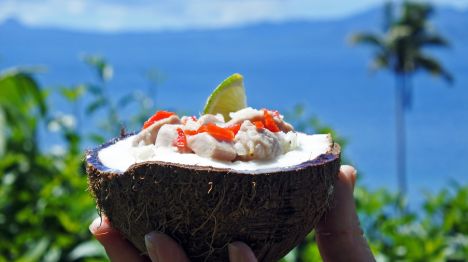 Kokoda
Kokoda
You don’t need a Michelin-star to deliver a feast worth remembering, and this is one of those occasions. The most important Fijian dish you’ll want to tick off your Fiji Foodie Bucket List is kokoda. This national delicacy features the mahi mahi, a large, brilliantly coloured ocean fish found locally. Served raw, the mahi mahi is marinated in a delicious concoction of coconut cream, lime, onions, and tomatoes that will have your taste buds writhing in delight! Often served in a coconut, this visual masterpiece is a feast for the senses. As well as being the centrepiece of this famous Fijian meal, fish are an integral and delicious part of the culture and nutrition. Kokoda is less of a meal, more a way of life. This mouth-watering, tender, and zesty ceviche dish is a must when in Fiji, the coconut milk making it ultra decadent. If we keep writing about it, we just might book a holiday immediately.
Duruka and Sweet Potatoes
Charming and not particularly fancy, but tasty nonetheless, comes Fiji’s most famous vegetables: duruka and sweet potatoes. This is food that needs no reinvention. These staples have been livening up meals and providing nutrients to locals for time immemorial. Duruka is a quirky vegetable that resembles asparagus, while sweet potatoes are orange-coloured root vegetables. Humble as they are, they deserve our attention.
Lovo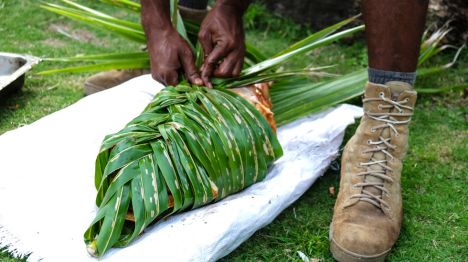
Preparing dinner in an underground oven called lovo is a tradition that transcends many generations past. Steaming in a hole is no easy task, but Fijian locals do it with pride and purpose, and the result is well worth the effort. The fragrance of lovo is mouth-watering and unique to Fiji. Inside this subterranean oven, on hot coals, meat and vegetables are wrapped in banana leaves and buried. While it’s a convenient and tasty way of cooking, it forms part of the celebration and gathering around food. The oven is lined with coconut husks which are lit on fire before being covered by stones, as the meal is left to slow cook for hours. The smoky aroma is captivating, and the result is tender; an unmissable experience when you next visit Fiji. Unearth a lovo feast on a cultural tour or sunset cruise with My Fiji.
Palusami
Another local staple that spotlights taro leaves and coconut cream, you can’t go past this bundle of goodness gently simmered until the leaves wilt. The result is palusami, a rich and creamy dish with a hint of smokiness. Often served to accompany roasted meats or delicious seafood, its simple yet rich coconut flavour is deeply satisfying and moreish in equal parts.
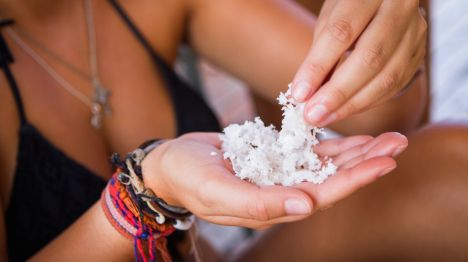 Coconuts
Coconuts
Coconuts are an absolute must-taste in Fiji, always tasting better when you’ve watched them being plucked from a palm tree and cracked open – it doesn’t get any fresher than that. The best part about coconuts is their versatility. Young coconuts provide sweet, hydrating coconut water, while mature coconuts provide lush, creamy milk. Both have a layer of juicy coconut flesh to scoop out with a spoon. Beyond that, they can create coconut oil, coconut gelato, coconut cream, coconut flakes, desiccated coconut, coconut sugar – the list goes on.
In addition to eating and drinking fresh coconut, Fijians use coconuts as a major ingredient in two iconic dishes: rourou and tavioka. Rourou is a simple and healthy side dish made by marinating taro leaves in coconut, while tavioka is a little heavier and consists of banana and vegetable tapioca cooked in coconut cream. YUM! Stay at the Sheraton Fiji Golf & Beach Resort with My Fiji to revel in a traditional coconut husking experience.
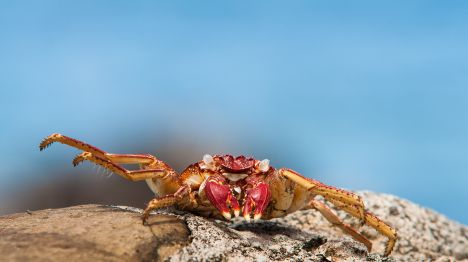 Mud Crab
Mud Crab
One of the most succulent of the seafood cuisine, the mud crab is insanely flavourful, and an important part of the Fijian culture. You’ll need crackers and a picker to get the most out of the crab – literally. Coupled with a spectacular sunset and backdropped by live Fijian music, there’s no better way to indulge in this dish. When slowly cooked in chilli sauce, it’s finger-lickin’ good. Get messy and enjoy a mud crab catching adventure en route to Robinson Crusoe Island with My Fiji.
Kava 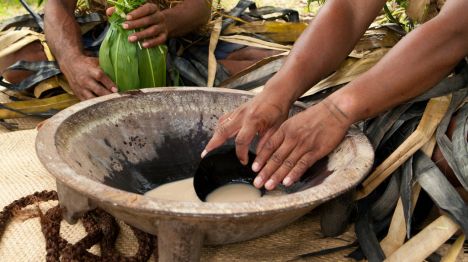
Finally, you’ll want to wash it all down. Fiji’s national drink is rather like muddy water, but it’s considered a great honour to drink kava in Fiji. This traditional fare is prepared by grinding the root of the pepper plant and combining it with water until you have a well-mixed liquid. Kava is consumed on special occasions, mostly when there are group gatherings where everyone connects. Embrace a traditional kava ceremony on My Fiji Island.
Culinary Chronicles
First founded by the Melanesian people, a diverse range of food and agricultural practices were brought with them. Fiji’s first settlers lived where the land was most fertile, focusing on foraged and farm-grown food. That history is written (or cooked) into the cuisine.
Getting There
Can’t wait to try these delectable traditional Fijian dishes? Create unforgettable memories in Fiji with sensory experiences that delight.
Your next Fiji adventure starts here. My Fiji has a perfectly packaged deals with handpicked inclusions for you. Be sure to pin or save this list or share with a friend.
Get away from it all with My Fiji and contact your friendly My Fiji Expert today.


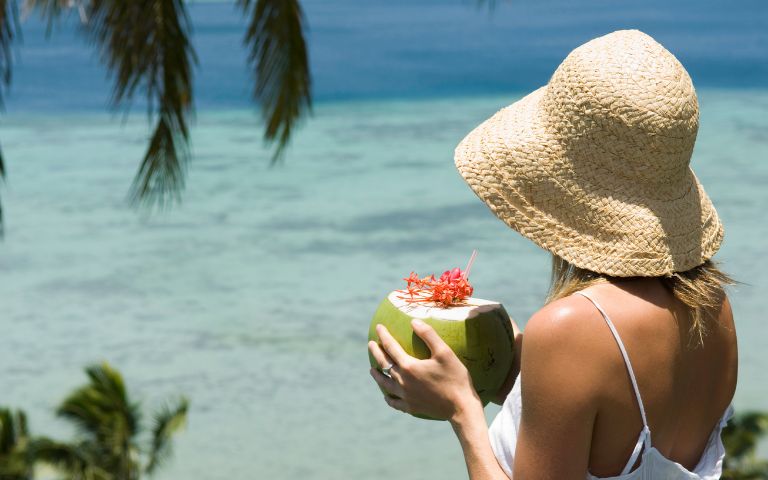
Share to
Facebook
Twitter
LinkedIn
Email